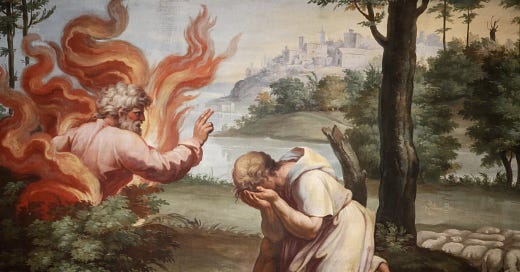He made known his ways to Moses,
his acts to the people of Israel.
Psalm 103:7
I know people who have absolutely no interest in the past. They live in the present, moving into the future--but never looking over their shoulders. I understand this up to a point. We can dwell so long on the past that we fail to live in the present, or we let our failures and tragedies weigh us down. The dead letter can choke, habit can bind, tradition can be an excuse for avoiding essential change, and memory (that thing which so haunted St. Augustine) can be a trap.
And yet, while all of this is true, the past must have meaning in a very particular way for Christians and Jews. The present is an outgrowth of the past, and God writes the story of His love for us in history. God did not start to exist. God always existed. It was time that started to exist, and it was of course God who created time.
Then, in a profound act of paternal love, God began to make himself known to his creation. He did it in a very narrow and particular way: with one people, and not a very important people at that. Indeed, It was not because you were more in number than any other people that the LORD set his love on you and chose you, for you were the fewest of all peoples.
And yet in spite of, or perhaps because of, their very smallness, He gave Israel the largest role among humanity. They would know Him--not merely by His works, but by His word and His action. God would act in history, and guide His wayward people, promising that My presence will go with you, and I will give you rest. They would carry that gift through the centuries, bearing witness to His mighty actions.
And when we wandered from the path He charted for us--as of course we were free to do from the moment He showed us two trees in the Garden--He would call us back, sometimes by the still small voice of His mercy, and sometimes by the harsh punishment of His justice. Gradually, as we were ready for it, God revealed his plan of loving goodness. Then, in the fullness of time, He entered time, to walk among us, to teach us, and to lay down His life for us. And then He took up the life again, and broke the chains of death.
All of it happened in time. All of it is part of history. All of it is past. But since He is God, what He does in time echoes in eternity. It never ends.
God has spoken to Moses. God speaks to Moses. God will speak to Moses.
God no longer speaks to His prophets in our day, but instead breaks into our lives through the sacraments, in which the people of God continue to walk with Him, and through which He continues to act in time. The waters of baptism washed you. The waters of baptism wash you. The waters of baptism will wash you.
Christ's body will be broken for us, has been broken for us, and continues to be broken for us at every mass. Time folds upon itself at the altar, and it is once again Judea two-thousand years ago.
It happens on a smaller scale within each human heart. At the end of A Christmas Carol, Scrooge promises "I will live in the Past, the Present, and the Future. The Spirits of all Three shall strive within me." He reconciles the sins of his past and the bad habits of his present with the hope of his future, and all three "strive within" him. That phrase suggests it won't be easy to reconcile the three, but that in the striving, he will find life and balance and redemption. In a similar way, so do we.
At our baptism, God began walking with us in time, and because He is God, part of us continuously touches eternity without fully experiencing it. God's time and our time are not the same, and one day our time will come to a very sudden stop, and the veil that separates us from God will drop away, and we will pass fully into eternity. That's when the real glory begins.
O Lord, I have heard the report of you,
and your work, O Lord, do I fear.
In the midst of the years revive it;
in the midst of the years make it known;
in wrath remember mercy.
Habakkuk 3:2.
This is part of an occasional series of meditations on Psalm 103.




